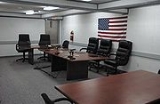
Administrative Review Board
Encyclopedia

Suspect
In the parlance of criminal justice, a suspect is a known person suspected of committing a crime.Police and reporters often incorrectly use the word suspect when referring to the...
s held by the United States in Camp Delta
Camp Delta
Camp Delta is a permanent detainment camp at Guantanamo Bay that replaced the temporary facilities of Camp X-Ray. Its first facilities were built between February 27 and mid-April 2002 by Navy Seabees, Marine Engineers, and workers from Halliburton subsidiary Kellogg, Brown and Root...
in the United States Navy
United States Navy
The United States Navy is the naval warfare service branch of the United States Armed Forces and one of the seven uniformed services of the United States. The U.S. Navy is the largest in the world; its battle fleet tonnage is greater than that of the next 13 largest navies combined. The U.S...
base at Guantanamo Bay, Cuba
Cuba
The Republic of Cuba is an island nation in the Caribbean. The nation of Cuba consists of the main island of Cuba, the Isla de la Juventud, and several archipelagos. Havana is the largest city in Cuba and the country's capital. Santiago de Cuba is the second largest city...
.
The purpose of the Board is to review whether the suspects still represent a threat. American President George W. Bush
George W. Bush
George Walker Bush is an American politician who served as the 43rd President of the United States, from 2001 to 2009. Before that, he was the 46th Governor of Texas, having served from 1995 to 2000....
initially called the suspects "illegal combatants."
But, without a formal announcement of the policy change, the Bush Presidency changed their description to "enemy combatant
Enemy combatant
Enemy combatant is a term historically referring to members of the armed forces of the state with which another state is at war. Prior to 2008, the definition was: "Any person in an armed conflict who could be properly detained under the laws and customs of war." In the case of a civil war or an...
". From July, 2004 through March, 2005 military authorities conducted a one-time Combatant Status Review Tribunal
Combatant Status Review Tribunal
The Combatant Status Review Tribunals were a set of tribunals for confirming whether detainees held by the United States at the Guantanamo Bay detention camp had been correctly designated as "enemy combatants". The CSRTs were established July 7, 2004 by order of U.S. Deputy Secretary of Defense...
for each suspect, to confirm whether they had been properly been classified as an "enemy combatant".
The Combatant Status Reviews were criticized by human rights workers because the suspects were not entitled to legal counsel, and did not know what allegations they had to defend themselves against, and the suspects had no presumption of innocence. The ARB was created in an attempt to mitigate the harsh results of potentially indefinite detention
Indefinite detention
Indefinite detention is the incarceration of an arrested person by a national government or law enforcement agency without a trial. It is a controversial practice on the part of any government or agency that is in violation of many national and international laws, including human rights laws...
by allowing an annual review to determine whether the enemy combatant
Enemy combatant
Enemy combatant is a term historically referring to members of the armed forces of the state with which another state is at war. Prior to 2008, the definition was: "Any person in an armed conflict who could be properly detained under the laws and customs of war." In the case of a civil war or an...
should still be detained.
The Combatant Status Reviews determined that 38 suspects were not illegal combatants after all. They determined that the rest of the suspects had been correctly classified as "enemy combatants" during their original, secret, classifications.
The first set of Administrative Reviews took place between December 14, 2004 and December 23, 2005. The Boards met to consider the cases of al 463 eligible detainees. They recommended the release of 14 detainees, and the repatriation
Repatriation
Repatriation is the process of returning a person back to one's place of origin or citizenship. This includes the process of returning refugees or soldiers to their place of origin following a war...
of 120 detainees to the custody of the authorities in their home countries.
The United States Department of Defense
United States Department of Defense
The United States Department of Defense is the U.S...
(DoD) was under a court order
Court order
A court order is an official proclamation by a judge that defines the legal relationships between the parties to a hearing, a trial, an appeal or other court proceedings. Such ruling requires or authorizes the carrying out of certain steps by one or more parties to a case...
from United States District Court
United States district court
The United States district courts are the general trial courts of the United States federal court system. Both civil and criminal cases are filed in the district court, which is a court of law, equity, and admiralty. There is a United States bankruptcy court associated with each United States...
Judge Jed Rakoff to release the names of all the detainees by 6:00 p.m. EST on March 3, 2006. The Department of Defense ("DOD") did not meet this deadline. They delivered a CD-ROM with approximately 5,000 pages of documents at 6:20 pm. DoD had to take that CD-ROM back and issue a second copy that with redacted files that DoD decided not to release.
Factors for and against continued detention
As part of this release of documents the DoD released three portable document formatPortable Document Format
Portable Document Format is an open standard for document exchange. This file format, created by Adobe Systems in 1993, is used for representing documents in a manner independent of application software, hardware, and operating systems....
files containing summaries of the factors for and against the release of some of the detainees.
These documents summarized the factors for and against the continued detention of 120 detainees. These documents contain the detainee's names. The DoD has not explained why they did not comply with Rakoff's court order and release the factors for and against the other 343 detainees.
Some of the factors listed in favour of continued detention for some detainees were repetitions of allegations that had already been refuted during the detainee's Combatant Status Review Tribunals.
Summarized Transcripts of Administrative Review Board hearings
The DoD also released an incomplete set of four portable document format files containing summarized transcripts from administrative review board hearings.Over the next six weeks the DoD released 15 more portable document format files containing transcripts.
Most of these transcripts do not contain the detainees names. However, almost all the transcripts bear the detainee's Guantanamo ID number on the lower right hand corner of each page, and on April 20, 2006, and on May 15, 2006, the DoD released lists of the detainees, with their associated detainee IDs.
In early September 2007 the Department of Defense published additional documents from the second set of Review Board hearings convened in 2006.
The Department published ten portable document format files. Less than twenty percent of the remaining captives participated in their hearings. The Department only published transcripts of the hearings for which captives chose to participate.
Releases
According to an article from the International Herald TribuneInternational Herald Tribune
The International Herald Tribune is a widely read English language international newspaper. It combines the resources of its own correspondents with those of The New York Times and is printed at 38 sites throughout the world, for sale in more than 160 countries and territories...
from April 22, 2006 the ARB had determined three detainees could be released and 107 detainees could be repatriated to the custody of their home country, yet they still remained in Guantanamo.
U.S. officials said their continued detention was due to concerns the detainees might be tortured or killed if they were returned or repatriated.
Observers
Very few of the Review Board hearings were observed by members of the press. Adam Brookes of the BBCBBC
The British Broadcasting Corporation is a British public service broadcaster. Its headquarters is at Broadcasting House in the City of Westminster, London. It is the largest broadcaster in the world, with about 23,000 staff...
wrote, on April 8, 2005, about being allowed to sit in on the first Administrative Review Board hearing where observers were permitted. He wrote that over sixty Review Board hearings had been convened with no press attendance.
External links
- Guantanamo Bay Detainee Administrative Review Board Decisions Completed, US Department of Defense, February 9, 2006
- I Have Not Seen An Ounce Of Democracy Here, Says Detainee, BernamaBERNAMABERNAMA is a news agency of the government of Malaysia. It is an autonomous body placed under the Information, Culture and Communications Ministry. It was set up by an Act of Parliament in 1967 and started work on 26 May 1968....
, October 14, 2005 - Inmates including Kuwaitis to be subject to certain procedures -- US, Kuwait News AgencyKuwait News AgencyThe Kuwait News Agency is a news agency centered in Kuwait. It was established on October 6, 1979 according to an Amiri Decree to gather news and information and distributing it to media institutions and individuals. The news agency currently holds offices in most Arab countries, along with...
, September 20, 2005 - [ transcripts released under court order], US Department of Defense, March 3, 2006

